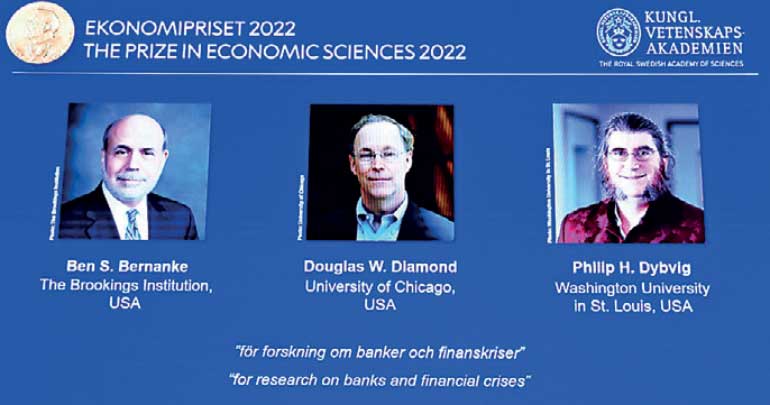Monday Mar 02, 2026
Monday Mar 02, 2026
Tuesday, 11 October 2022 00:35 - - {{hitsCtrl.values.hits}}

2022 Nobel Economics Prize laureates Ben Bernanke, Douglas Diamond and Philip Dybvig are seen on a display during a press conference to announce the winners yesterday – AFP
STOCKHOLM, AFP: A US trio, including ex-Federal Reserve Chief Ben Bernanke who played a key role battling the 2008 financial crisis, won the Economics Nobel on Monday for research on banks in times of turmoil.
Bernanke, together with Douglas Diamond and Philip Dybvig, were honoured for having “significantly improved our understanding of the role of banks in the economy, particularly during financial crises, as well as how to regulate financial markets,” the jury said.
Bernanke, 68, has been both credited for spurring recovery after the 2008 recession and pilloried by critics for doing little to avert it, allowing investment bank Lehman Brothers to collapse.
He received the award for his analysis, conducted in the early 1980s, of the Great Depression in the 1930s, the worst economic crisis in modern history.
In particular, Bernanke showed “how failing banks played a decisive role in the global depression,” making the downturn “not only deep, but also long-lasting,” the Nobel jury noted.
In his role as Chief of the Central Bank, Bernanke “was able to put knowledge from research into policy,” during the financial crisis of 2008-2009, the Nobel Committee said.
Bernanke has been hailed for the Fed’s unorthodox response of slashing interest rates and flooding the financial system with liquidity.
University of Chicago Professor Diamond, born in 1953, and Dybvig, 67, a Professor at Washington University in St. Louis, were honoured for showing how “banks offer an optimal solution” for channelling savings to investments by acting as an intermediary.
The pair also showed how these institutions were vulnerable to so called banks runs.
“If a large number of savers simultaneously run to the bank to withdraw their money, the rumour may become a self-fulfilling prophecy – a bank run occurs and the bank collapses,” the Nobel Committee said.
The Committee added that this dangerous dynamic can be avoided by governments providing deposit insurance and giving banks a life-line by becoming a lender of last resort.
“The laureates’ insights have improved our ability to avoid both serious crises and expensive bailouts,” Committee for the Prize in Economic Sciences Chair Tore Ellingsen said.
“In a nutshell, the theory says that banks can be tremendously useful but they are only guaranteed to be stable if they are properly regulated,” he added.
Diamond, speaking to reporters after the announcement, reflected Monday on the decision by US authorities not to bailout US investment bank Lehman Brothers, as they later did other financial institutions.
The bank’s collapse sent shockwaves through financial markets when it filed for bankruptcy in September 2008.
“It would have been better to find a more accommodating way, a less unstable way and unexpected way to resolve Lehman Brothers,” Diamond said, stressing there were questions about what regulators were legally able to do at the time.
“Had they found a way, I think the world would have had less of a severe crisis than it did,” Diamond said.
Of all the Nobels, the economics prize has the fewest number of female winners, just two since it was first awarded in 1969 – Elinor Ostrom in 2009 and Esther Duflo in 2019.
The economics prize, set up by the Swedish Central Bank, was the only award absent from the original five created by scientist Alfred Nobel, sometimes earning it the moniker of “false Nobel”.
But like the other prizes it comes with a medal and an award sum of 10 million Swedish kronor (around $ 900,000).
The winners will receive the prize from King Carl XVI Gustaf at a formal ceremony in Stockholm on 10 December, the anniversary of the 1896 death of scientist Alfred Nobel who created the prizes in his last will and testament.
Last year, the honour went jointly to Canada’s David Card, Israeli-American Joshua Angrist and Dutch-American Guido Imbens for research that “revolutionised” empirical work in their field and brought better understanding of how labour markets work.
The Economics Prize closes this year’s Nobel season.